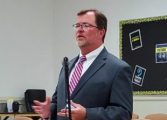By Ruthann Carr
Correspondent
One day after the governor’s press conference on opening schools, Fluvanna School Superintendent Chuck Winkler said his staff is working long hours to comply with new guidelines.
“The first thing to do is send out a survey to all parents,” Winkler told the school board at the meeting Wednesday, June 10.
Gov. Ralph Northam said schools will be allowed to slowly resume in-person classes this summer and fall.
Even so, Winkler said he’s required to submit within 15 days before the start of school a plan for how Fluvanna will conduct learning in a virtual environment.
Fluvanna’s start date is Aug. 3.
However, Winkler said from the beginning, and again Wednesday, the date is not written in stone.
Much depends on the pandemic and what needs to be done to stop the spread of Covid-19.
Northam’s plan allows schools to begin with pre-kindergarten through third grade. When, or if, in-person classes begin, safe, social-distancing will be required.
How that works and how to make distance learning equally available is what Winkler and his staff will be asking parents’ input on.
In other business:
After a discussion about the merits and drawbacks of E-Sports, the Board voted 3 – 2 to allow it in the high school using just one of the approved games. Pullen, James Kelley (Palmyra) and Shirley Stewart (Rivanna) voted for; Charles Rittenhouse (Cunningham) and Perrie Johnson (Fork Union) voted against.
Winkler said he is sending out a staff survey. This is the 11th year the Board did a survey
Donald Stribling presented the first draft of the high school cell phone policy. At its heart, the policy lets students have cell phones but they must keep them out of sight except during lunch break unless a teacher allows use for class work, said Stribling, the executive director of human resources, student services and operations.
If students need to make a call to a parent, they must first get permission.
Stribling said the committee will meet again to fine tune the policy.
The Board also had a first review of the school wellness policy. Many on the Board complemented Stribling on how comprehensive it was.
When reviewing the Virginia School Board Association policies, Board Chair Johnson said she took exception to the policy on “Teacher Removal of Students from the Classroom.”
“This policy derives from legislation prompted by teachers’ frustration over discipline,” Johnson said. “It is clear that our Fluvanna teachers are concerned about discipline…Instead of acknowledging teachers’ concern with both safety and lost instructional time, the way this policy is written, to remove a student even to study hall or the principal’s office, parents must be notified in advance, an incident report must be filed before the removal and two reports must already be on record from previous incidents. This is completely unrealistic and unhelpful. It is also unrealistic that the policy requires teachers to write incident reports for all disruptive behavior. The lost instructional time would be phenomenal if this were to happen.”
Johnson’s strongest language was left for the final statement in the policy: “The policy ends with a very telling statement that has nothing to do with a teacher’s authority to remove a student from the classroom and everything to do with warning a teacher that, as they already know, discipline referrals are often seen as deficiencies in classroom management rather than an acknowledgment that a respectful teacher has already tried many techniques to stop a student’s disruptive behavior and the best course of action at this point, for that student and the rest of the class is to remove the disruption. The policy ends with this statement: ‘Teacher deficiencies in classroom management shall be addressed in teacher evaluations.’ I believe this policy does not address the spirit of the legislation, makes a big problem worse and disrespects the judgment of dedicated teachers who want all their students to learn.”
Kelley said he did not see the last line as the threat Johnson did, but asked how the written policy stacks up against what is actually practiced.
Winkler promised to look into it and bring back more information at the next meeting.
Finally, the Board unanimously approved the July meal program and putting $600,000 to reconcile FY20 insurance claims.




